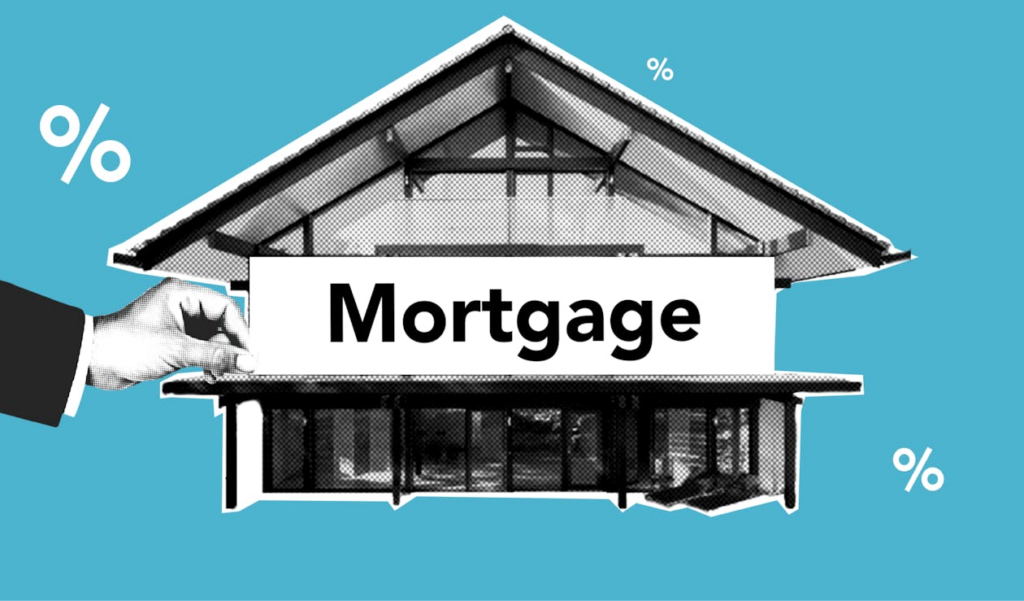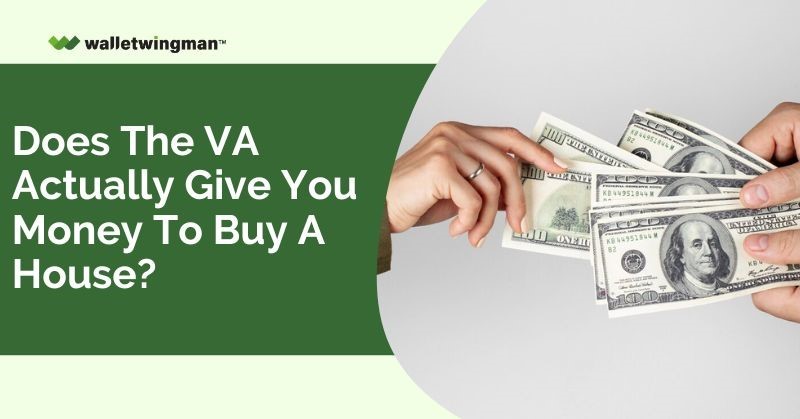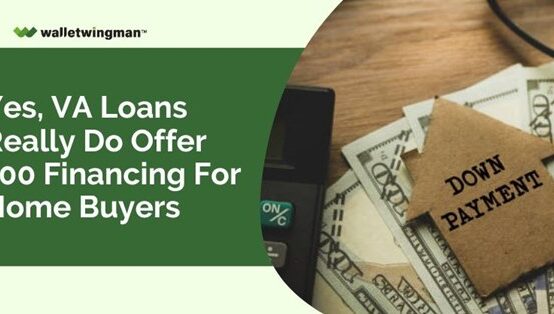When I use a VA home loan, does the Department of Veterans Affairs give me the money to buy a house?
It is one of the most common questions about the VA loan program, especially among first-time buyers new to the process.
The short answer is no. The VA does not give you money to buy a house. What it does is guarantee the mortgage loans generated by lenders in the private sector. That’s its primary role and function when it comes to VA loans.
This is a common misconception and a point of confusion among borrowers. So, let’s take a closer look at how it all works.
VA Does Not Give You Money to Buy House

While the VA does not give you money to buy a house, they are important to the lending process. Without the backing of the Department of Veterans Affairs, the VA home loan program would cease to exist.
However, the money you receive to buy a house will come from a mortgage lender, just like it would for a regular or conventional home loan. Lenders must be approved by the Department of Veterans Affairs before offering VA loans to borrowers.
There are basically three primary “players” involved in a typical VA loan transaction:
1. Borrower: Person Receiving the Money

The borrower is the individual who applies for and receives the VA loan. In the case of VA home loans, the borrower is typically a veteran, active-duty service member, or an eligible surviving spouse.
VA loans are designed to help military members and veterans purchase homes with favorable terms, including no down payment requirement and competitive interest rates. The borrower is responsible for meeting the eligibility criteria the VA sets and providing the necessary documentation to the lender.
In addition, the borrower is equally crucial in the loan process; they need to ensure they fulfill all the requirements. They reap the benefits pertaining to their service, for example, better loan approval timelines and flexibility to alter payment conditions.
By meeting their obligations, borrowers will enjoy access to the assistance they need to achieve homeownership and get ready for the financial future.
2. Lender: The Company Providing the Money

The lender is the financial institution or mortgage company that provides the funds for the VA loan. They’re the ones that give you the money to buy a house.
While the VA warrants a portion of the loan against default, the lender still assumes some risk. Because of this, they will evaluate the borrower’s creditworthiness, income, and numerous other financial factors to determine their eligibility for the VA loan.
Lenders can also impose their own requirements in addition to the basic eligibility guidelines set forth by the Department of Veterans Affairs. For example, a mortgage lender might have specific requirements for a borrower’s credit score or debt-to-income ratio.
Beyond evaluating borrowers’ financial competence and VA loan documents, lenders also guide them through the entire loan process. This entails helping them understand available options, fill out documents, and comply with any relevant regulation or law to the loan. They offer indispensable services and guide veterans through the secure process when purchasing their dream home through the VA loan program.
3. VA: Government Agency Backing the Loan
The Department of Veterans Affairs has a vital role in the VA home loan process. As mentioned above, it guarantees the lender against loss in the event of borrower default. This encourages lenders to provide more favorable terms to borrowers, including lower interest rates and no down payment requirements.
The VA also offers support services to veterans, helps them understand VA loan benefits, and helps them navigate the loan application process. But they do not lend money to borrowers. Instead of giving you 100 percent home loan money to buy a house, the VA makes obtaining mortgage financing through a lender easier.
What is the VA Loan Approval Process?
The VA loan approval process includes a number of steps that you need to go through to ensure your application gets approved for a mortgage provided by the Department of Veterans Affairs (VA). It is designed to serve all these needs of the veterans, active-duty service members, certain Reservists or National Guard members, and eligible surviving spouses who intend to purchase or refinance their home.
The VA loan approval process typically involves several key stages:
- Eligibility Verification
Step one in the VA loan approval process is verifying whether the borrower is eligible to participate in the program. Eligibility criteria may comprise meeting minimum service requirements, resting on the status of your military service member.
Veterans, persons in the military service, and other classes of the eligible ones may avail of the Veteran Affairs (VA) loan. You get a Certificate of Eligibility (COE) from the Department of Veteran Affairs in order to verify your eligible status.
- Pre-qualification or Pre-approval
Before embarking on a property hunt, you decide to obtain pre-qualifications or pre-approval on VA loans. The pre-qualification process involves a preliminary screening of your financial condition, which includes income level, assets-to-liabilities ratio, and credit report.
Pre-approval takes the form of a more comprehensive procedure with the citation of a bank statement and a job contract to prove income, employment, and other financial factors. It gives you a clearer understanding of what you can buy and strengthens your bidding position when making offers on houses.
- Home Search and Offer
Pre-approved; the next step is to look around for homes that are within your budget. You can work with real estate agents to choose the properties that would meet your requirements. When you find the right home, draft an offer to buy for that house, which includes the terms and conditions of the sale.
- Property Appraisal and Inspection
Following the confirmation of the buyer’s offer, the VA loan approval procedure continues with ordering a property appraisal and inspection.
The Veterans Administration requires a professional appraisal to set the Fair Market Value of the property and meet the respective Minimum Property Requirements (MPRs).
Besides, you can arrange to have a home inspection conducted to find any possible issues with the property.
- Loan Processing and Underwriting
Once the appraisal and inspection are complete, the loan file moves to the processing and underwriting stage.
During this phase, the lender verifies your financial information, reviews the appraisal report, and evaluates the overall risk associated with the loan.
The underwriter assesses your creditworthiness, debt-to-income ratio, and several other factors to determine whether to approve the loan.
- Loan Approval and Closing
If the loan application is approved, the lender issues a commitment letter outlining the terms and conditions of the loan. You review and sign the loan documents, and any remaining conditions are satisfied. Finally, the loan closes, and the funds are disbursed to complete the purchase or refinance transaction.
Throughout the VA loan approval process, you work closely with your lender, real estate agent, and other professionals to navigate each stage efficiently. By understanding the steps involved and staying organized, you can streamline the process and achieve your homeownership goals with a VA loan.
Where Do I Send My Monthly Payments?

This is another common question relating to the VA loan program and a direct extension of the question we started with. The Department of Veterans Affairs does not give you money to buy a house. Nor do they collect the monthly payments.
In a typical VA loan scenario, the borrower or homeowner submits their monthly mortgage payments to the lender or loan servicer, not directly to the Department of Veterans Affairs.
Below are the steps to get a VA loan:
1. Loan Origination: To initiate the 100 VA loan financing process, you’ll apply for a VA loan through a mortgage lender, as described earlier. Once you’re approved, the loan is officially “originated,” and you become responsible for repaying the debt. The repayment loan terms are outlined in the agreement.
2. Closing: This is the final step in the home purchase process after the VA loan underwriting process. During the closing, all necessary legal documents are signed, and property ownership is transferred from the seller to the buyer. This is also when you’ll pay your closing costs.
3. Loan Servicing: After closing, the lender might choose to service the 100 financings themselves or transfer the servicing rights to a “loan servicer.” The loan servicer is liable for managing the loan account, processing payments, and handling escrow accounts (if applicable). They also provide customer service to the borrower when necessary.
4. Payment Process: You’ll receive a monthly mortgage statement from the lender or loan servicer outlining the due date, the amount due, and payment instructions. Borrowers typically have several options for making their monthly payments, including online payments, automatic withdrawals, and mail payments.
5. Communication and Support: Throughout the repayment period, you can connect with your mortgage lender or loan servicer for help with payment-related questions or concerns. You can also contact them regarding loan modification or assistance programs in some cases.
As you can see, the Department of Veterans Affairs mostly works in the background during the VA loan process. They establish the program’s guidelines, certify borrower eligibility, and guarantee a portion of the loan amount with the lender.
But the VA does not give you money to buy a house.



 How Veterans Can Utilize VA Loans For Investment Property Ventures
How Veterans Can Utilize VA Loans For Investment Property Ventures  Who Manages My VA Loan After Closing?
Who Manages My VA Loan After Closing?  Yes, VA Loans Really Do Offer 100% Financing for Home Buyers
Yes, VA Loans Really Do Offer 100% Financing for Home Buyers 